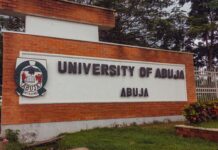Stakeholders at a special Anti-Corruption Situation Room (ACSR) forum organised to mobilise a sustained consciousness amongst the civil populace on the need for collaborative engagement in the fight against the hydra-headed monster of corruption, has called for the harnessing of energy and passion of the youth as a way of preparing them ahead in the fight against corruption.
The one-day round table held in Abuja on September 20, 2018, was organised by Human and Environmental Development Agenda (HEDA) in partnership with ACTIONAID andMacArthur Foundation, was attended by over 100 participants which include representatives of relevant agencies of government namely; Independent Corrupt Practices and other Related Offences Commission (ICPC), Economic and Financial Crime Commission (EFCC), the Consumer Protection Council (CPC), and the National Orientation Agency (NOA). Also in attendance were students in Anti-Corruption and integrity Clubs in select Secondary Schools within the Federal Capital Territory (FCT) and its environ as well as representatives of civil society and the media
According to the organizers in a communique issued after the meeting and signed by Mr. Olanrewaju Suraju, the special ACSR with the theme: Engaging anti-corruption stakeholders in promoting integrity, honesty and accountability in public service and private sector oversight, was aimed at enhancing and enhance transparency and accountability in governance and service delivery.
The special ACSR also had in attendance –Technical Unit on Governance and Anti-Corruption Reforms (TUGAR), PremiumTimesCentre for Investigative Journalism (PTCIJ), African Centre for Information and Media Literacy (AFRICMIL), Akin Fadeyi Foundation, Yar’adua Foundation and philanthropic platforms – MacArthur Foundation.
Speaking at the event, the chairman of HEDA, Mr. Olanrewaju Suraj, explained that the special ACSR was aimed at creating a platform of conversation amongst stakeholders in the anti-corruption crusade; noting specifically however that the CPC has also stepped into the fray by complementing anti-corruption efforts as manifested by its commitment to addressing the complaints of citizens promptly and dispassionately.
The Deputy Country Director of MacArthur Foundation, Mr. Dayo Olaide emphasised the need for concerted efforts by network of actors in the society in the fight against corruption while applauding the participation of younger citizens in the special ACSR which is in line with the quest for sustaining efforts at combating corruption.
The representative of ICPC Mrs. Azuka Ogugua advocated continuous engagement of younger Nigerians particular students in secondary schools to achieve inclusive vigilance and collective engagement with the fight against corruption
On his part, the Director of Orientation and Education of EFCC, Mr. Sammin Amadin urged stakeholders in the private and public sectors to embrace probity, transparency and accountability which are the hallmarks of democratic society.
The Director General of NOA Dr. Garba Abari who chaired the opening session of the special ACSR reiterated the critical roles the EFCC and the ICPC have been playing in the fight against corruption.
The Director General of Consumer Protection Council (CPC), Mr. Babatunde Irukera delivered a paper on Consumer Protection through Regulatory Accountability and Corporate Responsibility.
In his presentation, Mr. Irukera lamented the existing gap in consumer protection in Nigeria compared with other countries. According to him, the Consequence Management System which determines the efficiency of the regulatory agencies remains a critical challenge in Nigeria.
The CPC boss submitted that the inadequacy of Consequence Management System was responsible for the pervasive culture of impunity and therefore advocated for regulatory standards to be sustained by institutions that operate within modicum of independence.
In a contribution from the perspective of professionals, the President Nigerian Institute for Quantity Surveyor (NIQS), Mr. Obafemi Onasile emphasised the need for professionals to be diligent and accountable to the code of conduct prescribed by their profession.
Mr. Onasile who said that the NIQS was already deploying mechanisms to uphold its code of conduct, further reiterated that every profession must adhere to self-regulation to prevent, protect and punish those who go against standard of practice.
Notable among observations made at the special ACSR include, Low level capacity amongst civil society platforms; Inadequate database on anti-corruption initiatives at the grassroots; inadequacy of channels of communication for regular follow up and feedback on corruption related issues, and weak enforcement mechanisms in professional association to hold accountable and sanction members caught in professional misconduct.
Other observations are: Gaps in campaign linking pervasive corruption in the society to the rising social menace as well as developmental challenges such as unemployment, declining social welfare, hunger, trafficking etc; lack/inadequacy of education curricular on ethics and anti-corruption in schools across the country, lack of adequate information on status of looted asset recovery, among others.
The following recommendations were also made by the special ACSR as a way of deepening engagement with anti-corruption crusade at all levels of the society: “The need to bridge existing gaps and inadequacies in citizens’ engagement with the fight against corruption in the country.
“The need to build effective citizens’ platforms particularly at the grassroots and amongst the younger generation for active engagement in the fight against corruption.
“The need to synergize stakeholders’ engagement towards value reorientation and in stimulating the right consciousness in enhancing the culture of Probity, Integrity, Honesty, Transparency and Accountability amongst a new generation of young Nigerians.
“The need to strengthen relevant institutions of anti-corruption agencies and regulatory bodies to insulate them from political influence and control.”
Other resolutions of the round table include, “The need to evolve a new national culture based on cardinal objectives of integrity, openness, transparency, and accountability in all facets of the society as a way of promoting popular consciousness about anti-corruption.
“The need for improved attention to citizens’ engagement with whistle-blowing policy as well as existing avenues for monitoring corruption such as FOI Act and other laws relating to transparency and accountability.
“The need to strengthening anti-corruption institutions through appropriate appraisals
of legal framework, legislation and policies,” among others.



